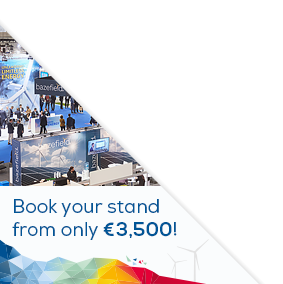Call for abstracts for WindEurope 2023
Siblings:
ProceedingsProgrammeProceedingsSpeakersPostersContent PartnersElectrification StageMarkets TheatreR&I ActivitiesStudent DayProgramme Committee & abstracts reviewersPresenters dashboardDeadline extended: 7 October
It’s that time of the year again! We’re all making plans for next year, and there’s one thing that should definitely be on your agenda: WindEurope’s annual event 2023, which will take place in Copenhagen from 25-27 April. Eager to present your work, meet your peers and help advance the wind energy sector?
We are calling for abstracts on technologies, concepts, research, ideas, and solutions that will help boost Europe’s energy security and speed up the transition to a renewables-based, electrified energy system.
The deadline to submit an abstract is 7 October 2022.
What is the scope?
WindEurope Annual Event 2023 is your annual wind energy conference and exhibition, so we will of course cover all aspects of onshore and offshore turbine technology, operations, but we will also keep the focus on how wind can support and drive the electrification of the wider energy system.
What kind of contributions are we looking for?
We are looking for concrete examples of already–implemented operational solutions, experience, and feedback from the field, including real-world data, as well as innovative research, concepts and ideas that can bring the sector forward.
Submitted abstracts should be related to the technical themes of the conference – as listed below. Scientific contributions should focus on applied research with a higher TRL (5 or above). Commercial pitches will be rejected.
Additionally, WindEurope believes that women can break the glass-ceiling in the wind energy industry. We therefore would like to encourage as many women as possible to submit their work for presentation through our call for abstracts.
Important dates
- Deadline for abstracts: 7 October 2022
- Review of abstracts: October 2022
- Notification of selection: early December 2022
Click on a button below to submit your abstract
General Track
Science & Research Track*
*Selecting this track offers you the possibility to have your work published in the IOP Journal of Physics (pending scientific committee approval).
Click on the tabs below to see the different lists of topics
Resource Assessment
- Modelling the wind at different scales (global scale, mesoscale, microscale, model chain)
- Turbulence, wakes and blockage
- Measurements & testing (LiDAR, SoDAR, Radar, satellite, wind tunnel, wave tank, cup anemometer)
- Big data & machine learning / digitalisation
- Mapping and wind atlases
- Wind forecasting
- Extreme conditions
- Climate change
- Data sharing, data standards
Turbine Technology
- Towers
- Rotors
- Blades: aerodynamics, aeroacoustics, aeroelasticity, materials
- Electrical components
- Design for extreme conditions (cold climate, tropics, extreme weather events)
- Foundations
- Materials
- Industrialisation
- Measurements and testing
- Digitalisation in design, testing and manufacturing
- Circularity by design
- Larger turbines
Wind Farms: Installation & Operations
- Installation & logistics for larger turbines
- Port infrastructure
- O&M
- Impacts of extreme weather events on operating assets
- Vessels
- Cables
- Soil modelling, aero-hydrodynamics, fluid-structure interactions
- Digitalisation in O&M to optimise performance
- Digitalisation in O&M to optimise control and monitoring
- Digitalisation in O&M to optimise maintenance
- Digitalisation to optimise installation and logistics
- Skills & training
- Health and safety standards & culture
- End-of-life (lifetime extension, dismantling and decommissioning, repowering)
- Operational strategies
- Wind farms: safe operations
- Wind farm control (incl. Yaw, loads, induction)
- Data sharing & Data standards
- Cybersecurity
Floating Offshore Wind
- Lessons from projects
- Installation and logistics
- Industrialisation
- Components (mooring cables, floaters, etc)
- Testing
- Modelling (aero-hydrodynamics, fluid-structure interactions…)
Digitalisation
- Data science, machine learning and AI
- Data standards and data sharing
- Open-source tools
- IoT instrumentation
- Cybersecurity
Environmental Sustainability and Social Acceptance
- Circularity by design (incl. embedded footprint of materials)
- Rotor blades recycling
- Components recycling
- Environmental impacts
- Biodiversity impacts (birds, bats, wildlife, marine species)
- Noise impacts
- Community engagement
- Spatial planning (on- and offshore, all aspects)
Grid and System Integration
- New technologies
- Grid optimization and technology roll-out
- Cables (export cables, inter-array cables, cables for clustering, cables for floating wind)
- HVDC developments, including HVDC multi-vendor multi-terminal offshore grids
- Hybrids offshore wind farms, clusters and energy islands
- Grid technology and infrastructure for Floating OWFs
- Business models for offshore grid developments
- Market design for large-scale integration of renewables
- Grid codes
- Grid forming
- System / ancillary services
- Wind power forecasting
- Colocation of projects and virtual powaer plants (wind + other generation such as solar PV)
- Storage
- Data exchanges between wind farm operators and TSOs/DSOs
- System resilience (extreme weather events and cybersecurity)
- Energy system modelling (multi-disciplinary modelling)
Renewable Hydrogen and Power-To-X
- Electrolyser technologies
- Coupling wind and hydrogen (incl. system design and system integration aspects of hydrogen)
- Hydrogen applications and e-fuels
- Infrastructure
- Regulatory issues
- Showcase of real projects
- Wind-to-E-charging
- Wind-to-Heating & Cooling
- Manufacturing processes
- Commercial and residential electrification







